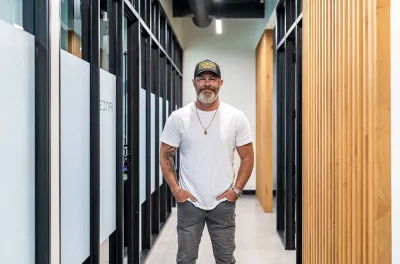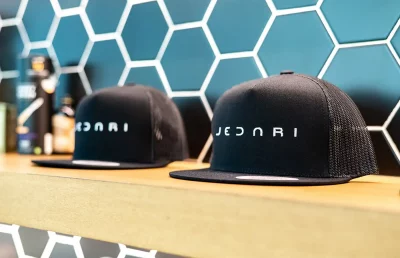
Jedari Makes Space for your Communities
Community

Jedari is the latest voice in the ever-growing Silicon Slopes tech haven brewing in Utah County. Put simply, the company aims to alleviate the troubles businesses, influencers and other internet communities experience on mainstream social media platforms through the creation of self-directed, private platforms for communication, conversation and collaboration. Co-founded by Greg W. Anderson and Sean Whalen, Jedari soft launched in January 2023 and just held the grand opening for their Lehi office in mid April. Already hosting nearly 50 clients and more than 5,000 users, the Jedari model provides an avenue for independent community building.
Over the last 13 years, Anderson worked on nearly 100 tech builds related to communication management, answering the question of, “How does somebody who has information sell that to somebody who wants it?,” he says. Alternatively, Whalen had been attempting to run his coaching community off of Facebook (with intermittent success) for nine years and was looking for a way out. “I thought, ‘There’s no way that I’m going to be able to scale a business through this platform’,” he says. “I started my quest of trying to find a different medium that allowed me to have my own community, run my own group, say what I wanted to say.”
“How does somebody who has information sell that to somebody who wants it?”
A few years ago, Whalen approached Anderson about the idea of creating a model with “more robust” business functions. Anderson says, “Traditional social media isn’t built for businesses,” citing a lack of monetizing and client response integrations as a prohibiting factor. “If you’re a musician and you want to create a safe space for your fans to come and communicate … but you’re also streaming a live jam session once a week and you want to charge for it, that doesn’t really belong on social media,” he says.
In contrast to social media, Jedari describes their work as “community management.” The company aims to “give all the communication tools that we’re utilizing in multiple different ways but give it to them in a white-label platform,” says Anderson. This means that, instead of building a page on an existing website, Jedari users can fully build out their own, fully functioning platform—“It’s their logos, their brands, their URLs, their iOS/Android applications,” says Anderson. “Everything … gives them and their users the feel that they just built this project. We want to prop them up.”
Whalen says, “We have everything that community manager or a community organizer … wants. Instagram’s great; it allows us to intermingle with tons of different people, tons of different ideologies, tons of different thought process. But, the Beanie Baby people don’t care about guns, and the furniture people don’t care about sports cars.” Jedari builds out a self-contained home for these communities where leaders and organizers can forge a space that works for their needs rather than trying to adapt their needs to the restrictive profile settings on an existing social site.
“We have everything that community manager or a community organizer … wants.”

Though newly available to the public, Jedari’s extant success speaks to a need in online communities that was previously left to fester behind the barrier of programming labor. “We did all the hard work that no one wants to do in building technology, where you can say, ‘I really love Facebook, but I want my own private deal,’ and you come to Jedari … [and] you can have your own portal or site by the end of the day,” says Whalen.
This model sets up limitless applications, with Anderson and Whalen pointing to parties as divergent as fitness influencers, political figures, sales teams and more finding their new home through a Jedari template. “It’s really meant for a community—whether that’s 50 people or 50 million, it’s bringing them together and give them a safe environment,” says Anderson. Anyone pursuing their own brand of connection and promotion has a potential future at Jedari.
Find more information and inquire about setting up your own platform, site or app at jedari.com.
Read more about Utah tech:
V School Bringing Opportunity to Salt Lake City
Salt Lake Crossroads Amateur Radio Club: Craft Lake City DIY Engineer